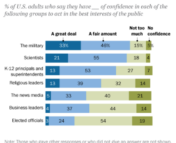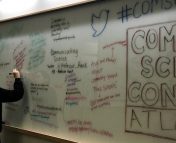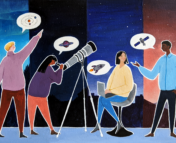Astrobites is written by graduate students around the world. Each year, some of our authors move on with their career, and we need new, passionate, talented science communicators to join our team! Read on to find out why you should apply, and when you are ready, you can apply here.
P.S. If you are an undergrad, you can submit a post on your research here, or anyone can submit a guest post here! Also consider signing up for @astrotweeps, which features a new astronomer or planetary scientist each week.
Develop Your Science Communication Skills
Astrobites is a great way to break into the science communication field. Our page has been visited nearly four million times, and we have readers from 200 countries and all 50 states. Becoming an author is great experience, whether you want to become a scientist with the ability to explain your research or pursue a career in science communication.
Personally, writing for Astrobites has opened up a huge number of possibilities. My experience with Astrobites gave me the necessary skills to get an internship at a public radio station, where I write science stories WHILE I am in grad school (I still can’t get over how much fun it is). If you’re looking to pursue science communication as a career, or just want to try it out, I think Astrobites is one of the best first steps you can take.
As a grad student, do you ever feel swamped from staring at code and equations all day? Author Jenny Calahan says writing for Astrobites is a creative outlet, which can be a great break from doing your own science. “I love astronomy and I enjoy creative writing, and Astrobites has merged those two passions,” Jenny says.
Our authors each post about once a month, which is enough to practice your writing, but not so much that it’s overwhelming. We also have the option to write special posts based on current events and collaborate on posts with other authors.
But Astrobites is not just about writing- as an author, you can also join one of our many important committees. Our committees are a really special part of Astrobites. They advertise the collaboration, put together educational materials for use in classrooms, and work towards making Astrobites the best that it can be.
Promote Diversity and Inclusion in Astronomy
We at Astrobites are always looking for new ideas that promote diversity, equity and inclusion, and you can be part of that effort (especially as part of our Diversity, Equity and Inclusion committee)! Some examples are our #BlackInAstro series and our recent effort to post articles in as many languages as possible.
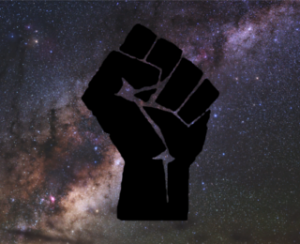
Our #BlackInAstro series highlights the work of Black astronomers and the ways in which racism affects their experiences.
Former author and administrator Gourav Khullar says this is one of the best parts about Astrobites. “Creating new content and boosting expert voices on themes concerning policy, education, equity, inclusion have been incredible learning opportunities,” Gourav says. “As a former co-administrator, I see Astrobites growing into a truly multi-faceted collaboration.”
And author Ellis Avallone says, “being part of a supportive community that works to make astronomy a more accessible field is just a small part of what makes Astrobites so great.”
Grow Your Network
This is arguably one of the biggest benefits of joining Astrobites. There are a lot of us authors, and we all work together to make Astrobites successful. Author Briley Lewis says, “Astrobites has drastically expanded my network by introducing me to other early career astronomers across the world.”
When we summarize papers, we also contact the scientists who wrote them. Jenny Calahan says, “I get to communicate with authors of the papers that I summarize, who are almost always very happy to have their work featured on Astrobites, and to chat if I had any questions.”
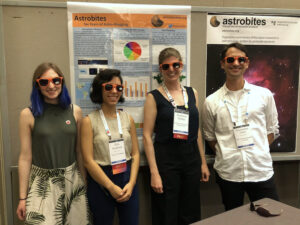
Look how much fun we have together at meetings like the AAS in Honolulu!
At meetings like the American Astronomical Society (AAS), we get to interview keynote speakers and cover press releases. That’s A LOT of exposure to well-known researchers. Author Jo Ramasawmy says she’s interviewed top researchers in her field and spoken on national radio. And Jo says, “being part of a network of 100+ passionate early career researchers has given me support, motivation, and purpose through some of the hardest parts of my PhD.”
Learn About Cool Astronomy
Last, but certainly not least, writing for Astrobites lets you dive even deeper into astronomy. You have complete control over what papers you cover. So if you want to learn more about something in your field, you can do that. And if you want a break from say, polarization measurements, you can write about the water on Mars! Author Amber Hornsby says, “being a part of the Astrobites collaboration means I not only have a great excuse to read outside my usual field, I also get to learn new astronomy every day.”
Astrobites has made me, and many others, better writers overall. Author Michael Hammer says, “as an author, writing my own Astrobites pushed me to read papers on topics I wouldn’t have explored otherwise. It has also shaped my approach towards how I write my actual research papers.” Reading papers in depth and summarizing them is one of the best ways to learn to write up your own research!
And if you need a pause from scientific results as a whole, you’ll also have the chance to write posts beyond astronomy. We cover topics like science policy, tips about graduate school, and even some relevant psychology.
SO APPLY ALREADY!
Applying to write for Astrobites was one of the best choices I have ever made. My hope is that the experiences shared in this article encourage you to make the same decision. The application is open and will be due mid-November. You can email [email protected] with any questions.
Astrobite edited by: Abygail Waggoner & Haley Wahl

